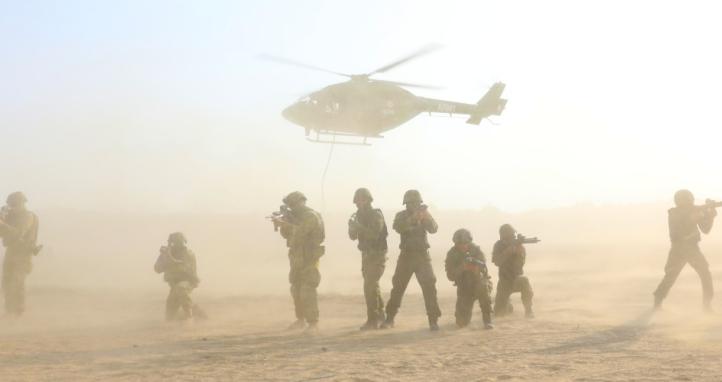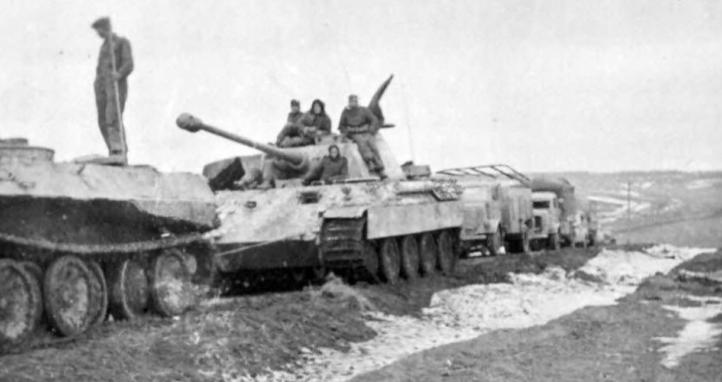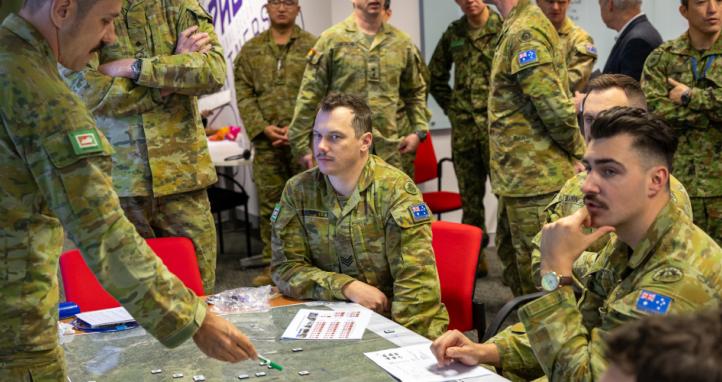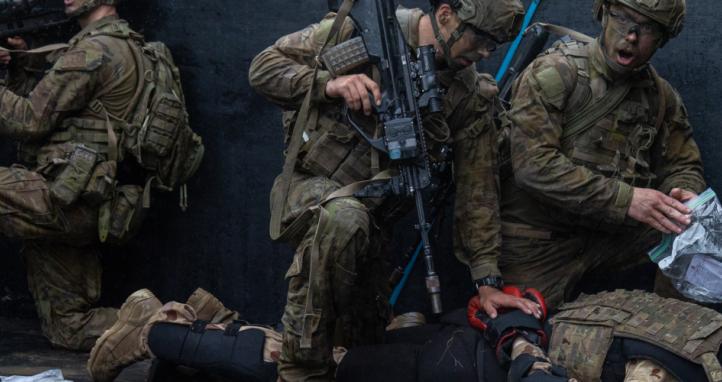The strategic environment that Australia inhabits is rapidly changing. The most noticeable aspect of this change are shifts in the regional balance of power and competing influence in the region to Australia’s north. This is complicated by the uncertainty being generated by the presidency of Donald Trump, both within a United States that has long been Australia’s great and powerful ally, and regionally. Yet in many ways, shifting power balances based on often conflicting interests among geopolitical actors are the normal cycles of international politics. Of greater concern are fundamental changes in how power flows between actors and how conflicts of interest are being contested.
The changing character of strategic competition The post-Cold War era has been marked by the resurgence of asymmetry – an approach to contending with others as old as conflict itself. For much of the post 9/11 era, the focus of Australian national security, defence and intelligence communities has been on adjusting to asymmetric conflict against mostly non-state actors, or irregular entities acting as proxies for state actors. However, Great Power conflict has returned, albeit transformed in character, tempo, and scope from that seen in the Cold War, and an era of hyper-competition is here. Our adversaries know that to compete on the traditional playing field of conventional warfare against a US-led collation is disadvantageous. As a result, they have expertly manoeuvred to embrace conflict below the threshold of conventional warfare. More importantly, while US and allied militaries have been concentrating on bolstering their capabilities below this threshold, these actors have been able to alter the rules of the game itself. This strategy is evident in the South China Sea. A slow and steady approach, combined with a persistent narrative of rightful Chinese claims to the region, has seen the threshold which would provoke a military response from the U.S. and its allies gradually eroded. This in turn has diminished the strategic utility of the traditional force in being, particularly in its capacity to reassure allies and to prevent regional decoupling. The disruption and manipulation of the American polity, most markedly via open and undefended digital information networks in the lead-up to the U.S. election, serves as another timely example of the kind of disinformation campaign waged by authoritarian states: there is no need to fight a conventional war when you can wage a cognitive war against a whole society without ever firing a shot. Yet these highly visible episodes belie a broader shift to an era in which the modes by which people contend with others have expanded across previously resilient lines of demarcation, what Freier and Dagle describe as the weaponisation of everything. As a result, the very nature of inter-state contest is undergoing a reorientation while, at the same time, traditional modes of contending employed by incumbent institutions are left struggling for a response.
Cognitive Warfare The idea of conflict below the threshold is no longer merely a question of bolstering capacities for the non-lethal aspects of contending which may or may not culminate in conventional conflict, often described as salami slicing tactics. Rather, the shift to contending in the cognitive battlespace subsumes the threshold altogether. Contending here requires a continuous, hyper-competitive, multi-domain effort, which is able to shift gears quickly and unpredictably while, crucially, maintaining a coherence of strategic intent which avoids self-defeating outcomes – a type of information fratricide. Conventional and lethal close-combat, the fundament of land power capabilities for which all contemporary standing armies prepare, remain at the heart of conflict between humans. But its status as the culminating feature of contending with others may be undergoing a forced reorientation. This reorientation is at the core of a successful asymmetric strategy: not only does it aim to never meet the adversary at their strongest point, but it reorients the contest to use an adversary’s strongest point against itself. If conventional land forces do not cognize this reorientation at the hands of an imaginative and unscrupulous adversary, then preparing exclusively for the close fight is unlikely to meet the challenges of national defence in the era of cognitive warfare.
The importance of trust as a strategic resource Cognitive war isn’t a new strategy; rather it is the culmination of a long term strategy which is paying off more than ever in a hyper-connected, social media saturated world. Russia undertook similar strategies during the Vietnam War, using misinformation to exacerbate racial divides in American society. However, the difference now is that misinformation is continuous and persistent, harder to identify, harder to stop, and part of everyday life for increasingly connected societies, which includes the majority of Australian citizens. The core purpose of cognitive war is to erode trust, both within and between societies. In particular, it targets the credibility of the narrative which underpins liberal democracies and the open and rules-based system they have maintained. It is true that many liberal democracies have done a good job of discrediting themselves: a type of market fundamentalism, which still resembles an article of faith among some elite ranks, has undeniably weakened countries and impoverished people. Nonetheless, openness, and the rule-making it engenders, is the fundamental strategic strength of western liberal democracies. Few Australian citizens seriously believe an international system of closed-off and recalcitrant nation-states represent a viable path to prosperity and peace in the 21st century. This is the truth about this race to the bottom on values of openness and lawfulness. It is driven by inherent strategic weakness. Australia and its allies should not mistake the remedy for the disease. To survive in a world of cognitive warfare, Australia needs a new strategy of defence. Misinformation, above all else, targets trust in open societies. It holds the aim of breaking down social cohesion, increasing societal divides, and distracting states with internal problems. Brexit is particularly illustrative of this. Trust has been eroded internally and externally, through playing on internal fears of migration and identity, and external mistrust of the European Union (EU) as a threat to British interests. As a consequence, Britain has been consumed by internal matters, to the extent that it has been barely able to respond to the Russian use of chemical weapons to assassinate individuals on British soil. If open societies are to continue to leverage their strategic advantages, and respond to the need for the renewal of a range of internal societal needs left trampled by the failures of market fundamentalism, they must be open to the mediations which must occur. This means cultivating and pushing forward their strongest values – based around their capacity and willingness to promote the conditions in which trust can thrive – rather than closing off, retreating from their values, and meeting their adversaries in a game of transactionalism, in which the most materially well-endowed and the most unscrupulous will prosper.
An approach for Australia The best defence, therefore, is to build trust. This is two-pronged. Firstly, trust needs to be rebuilt internally: the Australian people must have trust in democracy, in society, in government, and in institutions. Secondly, trust also needs to be cultivated externally. Australia needs to present itself as a trusted partner in the region through working to build trust and goodwill with its regional neighbours. The voluntary acceptance of a level of vulnerability in the presence of uncertainty is simply unavoidable. But it is an area in which Australian culture has thrived before. Australia cannot compete with the tactics of large, autocratic states on their own terms. Australia does not have the resources, the strategic culture, or the structural capacity to play a strictly transactional game. Indeed, a transactional game is not in Australia’s interests as transactional games are without rules: the highest bidder wins. Australia has been a key beneficiary of the rules-based global order. Therefore Australian defence has to be driven by the strategic renewal of, and investment in, its own values as an open, liberal, democratic society. Building trust internally will require increased transparency on matters of national security and a clearly articulated strategic narrative. Richard Flanagan’s speech to the Garma Festival provides valuable insights into what is required internally for Australian democracy to survive and thrive in a time when democracies across the globe are teetering. Decisive action is also required externally. Building trust with regional neighbours is fundamental both in combatting an environment of pervasive cognitive war, as well as the geopolitical challenges of increased Chinese presence and fear of U.S. decline in the region. The traditional geopolitical benefits of trust have been demonstrated to great effect by Japan. Japan’s ability to build trust in Southeast Asia, and alter its reputation from imperial warmonger to trusted partner, has afforded it a strategic presence and impact it would never otherwise have been able to achieve. Australia has punched above its weight in the past, using an image of trusted actor or 'good international citizen' to work multilaterally and contribute to efforts such as the Cambodian Peace Plan, the Chemical Weapons Convention, and achieving access to Syria for humanitarian groups. These initiatives provide a start point for future engagement. In the cognitive battlespace, trust only becomes a more important resource, albeit one not yet sufficiently acknowledged and invested in by Australia’s institutions. Building trust is the best defence in a world where the most effective offensive strategies of states are those which seek to undermine trust. Australian strategic planning therefore needs to start viewing trust as a central strategic resource vital to the defence of Australia.









